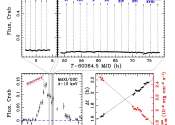Could axion decay underlie excess cosmic optical background?
The cosmic optical background (COB) is the visible light emitted by all sources outside of the Milky Way. This faint glow of light, which can only be observed using very precise and sophisticated telescopes, could help astrophysics ...








